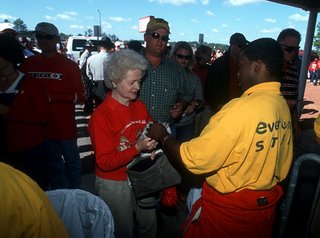 Chris Dade of the Beaumont Enterprise has a great feature story on legal issues surrounding stadium security and how views about those issues, and sports in general, have changed since the September 11, 2001 terrorist attacks ("When Games Really Mattered," 9/10/2006). Dade interviews several people for this story, including me. Here are some excerpts:
Chris Dade of the Beaumont Enterprise has a great feature story on legal issues surrounding stadium security and how views about those issues, and sports in general, have changed since the September 11, 2001 terrorist attacks ("When Games Really Mattered," 9/10/2006). Dade interviews several people for this story, including me. Here are some excerpts:
As in other times of national distress, sports helped the nation cope in the weeks and months that followed Sept. 11. "It certainly was that way immediately after 9/11," said Peter Roby, the director for Northeastern University's Center for the Study of Sport in Society in Boston. "Sports played an important role in people feeling comfortable with their lives." . . .
The U.S. may be divided on the war in Iraq and Bush's handling of terrorism, but it's united on another front, in America's stadiums and arenas. "It's a place for people to lose themselves," Roby said.
Keeping thousands of spectators safe, however, is a matter that has received more consideration in the years since the attacks, said Michael McCann, a law professor at Mississippi College School of Law . . .
McCann said another dynamic of security at sporting events comes from the attentiveness of spectators. He contrasted airline passengers on the lookout for anything suspicious with sports fans who are mainly focused on the game. "They're not thinking about security or what's around them," McCann said. "When you go to a game, you go to watch the game." . . .
Lines that form outside stadiums as spectators go through security ironically "could become a target," McCann said. "You never know."
Lynn Jamieson, a professor in the Department of Recreation and Park Administration at Indiana University, said the level of security at sporting venues generally varies within each league. She said the experience patrons have with security at a stadium or arena can be similar to an airport. "As with anything else, you can have an OK experience with security at one airport and a horrendous experience at another," she said. "There is never not going to be an issue."
If you're interested, I address stadium security, including the legality of pat-downs, in my forthcoming article in the Willamette Law Review entitled "Social Psychology, Calamities, and Sports Law".
Do you think increased efforts at stadium security have been working or has the absence of terrorist strikes at our sporting events simply reflected a lack of a credible threat?





0 comments:
Post a Comment